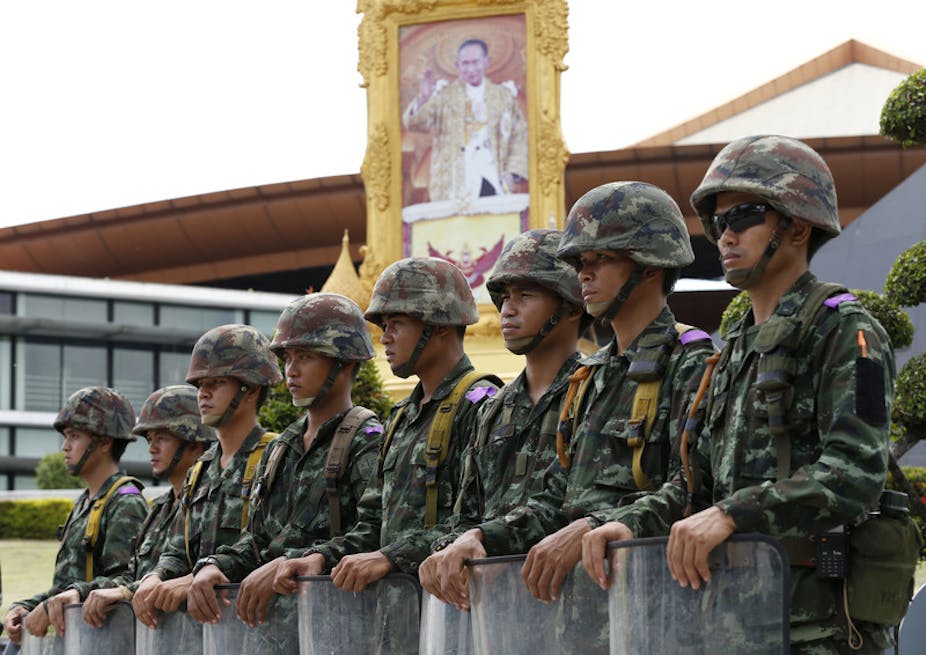For just over an hour, as Bangkok slept, the Thai military’s declaration of martial law went largely unnoticed.
The announcement was stage-managed. Made in the early hours of Tuesday May 20, the first signs on social media that something significant was happening were rumours of armed soldiers walking down the corridors of the country’s TV stations.
As the city began to stir, a document stating that martial law was now in place across the country began to circulate on social media. Then, at just after 6:30am, all broadcasts were interrupted. Army chief general, Prayuth Chanocha appeared in front of the camera to confirm the move.
Reading from a script, he informed the country that the military was now intervening in a crisis that has paralysed Thai politics since the final months of last year.
Red and yellow
On different sides of town, news of the development filtered through to two sets of protests. At Government House, “yellow shirt” anti-government demonstrators, who have occupied the streets of Bangkok for the duration of the conflict, would have been forgiven for seeing this as the move they had been waiting for. Over the past half-year they have been calling for the country’s judicial and military institutions to take action against a government they claim is corrupt and undemocratic.
United in their hatred for the popular authority of exiled former prime minister Thaksin Shinawatra, they have campaigned endlessly for the uprooting of a government that continues to earn support from its connection to him. For those who support the permanent removal of Thaksin and everything associated with him, it felt as if this might at last be the decisive action they sought.
On the other side of the Chao Phraya River, meanwhile, pro-government “red shirt” protesters were told by their leaders to remain calm. In a climate where many believe the country’s ruling elite are trying to permanently curtail their democratic rights, suspicions run high.
They have already seen the prime minister they elected, Thaksin’s sister Yingluck Shinawatra, ousted by a court they have lost faith in. But as one of their leading figures spelt out in a tweet, that the prudent response to the military action was to act with restraint and avoid any confrontation with the soldiers. Crucially, she explained, the caretaker government remained in power and there had been “no coup yet”.
As the day unfolded, however, there was little reassurance for those who feared a power grab. In the hours following the military announcement, a number of TV and radio stations were ordered to halt their broadcasts, and those that were left on air were told they must put out all military announcements. Broadcasters, along with written publications, were told to refrain from coverage that might “incite unrest”.
More worryingly still, in an announcement made toward the end of the day, the military stated that those writing on social networks could face prosecution for “questioning the law”. As news of the draconian measures spread, another protest sprang up at the centre of Thailand’s shopping district. There, protesters donned black gags to oppose the silencing of free speech, whilst others held placards with the slogans that read: “No Coup”, and: “We Vote”.
At the same time, there were few guarantees from the military that it would protect the democratic process. Instead, a statement was issued that the army was simply taking steps to maintain security. For those who suspected a coup, this was far from reassuring. While it might have been reasonable grounds for the imposition of martial law, those who support the government still question whether the military is genuinely capable of acting responsibly and fairly.
Winners and losers
Certainly, the killing of three anti-government protesters in a grenade attack last week was a deeply troubling development – but so was the chilling support that many of those protesting against the government gave to the deadly military crackdown on red shirt protesters back in 2010.
Yet perhaps the strangest thing was that despite the imposition of martial law, both sets of protesters were allowed to continue their demonstrations, ordered not to go home but to stay put. With anti-government protesters sensing victory and with red shirt protesters sensing defeat, the decision to keep those groups on the street was the clearest signal yet that Thai politics has entered very troubled water indeed.
In a political climate as heated and polarised as Thailand’s, the consequences of either side winning or losing outright are unthinkable. When compared to its neighbours in Southeast Asia, Thailand has remained relatively peaceful.
But pockets of extreme and bloody violence have at times threatened that image. In October 1976, for example, when student-led protests opposed to military rule were put down in a bloody massacre at Bangkok’s Thammasat University. Back then, the claim that they were “outsiders”, “communist” or even “Vietnamese” were used to legitimise the attacks and resulted in a protracted period of civil conflict between the Royal Thai Army and the Communist Party of Thailand.
Whether or not Thailand has to suffer those consequences again will only become clear after the military has explained in full how it sees its role in ending the conflict. However, if it fails to prove it can talk tough to those who seek a zero-sum solution, and if it does not recognise the current government as a vital player in any peaceful resolution, then its claim that what it did was “not a coup” will no longer be tenable.

